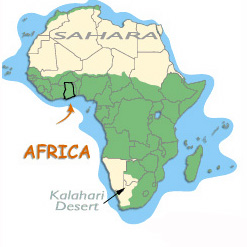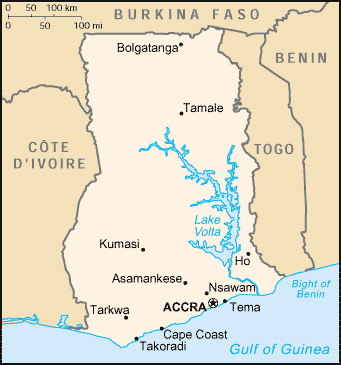 |
Ghana is on the western coast of Africa. |
Ford, director of UNMC’s Community and Multicultural Affairs, will spend eight weeks in the 140-acre Buduburam Refugee Camp working with Unite for Sight, an organization dedicated to health promotion and disease prevention. She leaves at the end of the month.
In addition to promoting eye care, the experience will give Ford a better understanding of the refugee culture. Nebraska has one of the largest Sudanese populations in the United States and Omaha has seen the recent arrival of Somali Bantu refugees.
“People coming in from Africa probably have the greatest bridge to cross regarding culture and language,” Ford said. “If I’m supposed to be guiding our campus and community on issues of cultural competency and diversity, then I need more knowledge on refugee issues. Being immersed in the culture will help us move forward.”
After spending a few days with new Somali refugees, Ford said she realized how little she understood about the refugee situation and how ill-prepared she was as an advocate.
In coordination with the local Liberian Refugee-run NGO “Self-Help Initiatives For Sustainable Development,” Unite For Sight is designing a comprehensive eye health program for children and teachers in the 43 schools at the Buduburam Refugee Camp, a one-hour drive northeast of the capital of Accra.
 |
The Buduburam Refugee Camp is a one-hour drive northeast of the capital of Accra. |
One of the most preventable problems in the area is vision loss, so Ford is requesting donations of four new or used opthalmoscopes, used eyeglasses (reading glasses, prescription glasses and sunglasses) and/or financial contributions. Donations will be accepted through Dec. 30 and may be sent to the Community Partnership office, ZIP 4040.
The Buduburam Refugee Camp is home to 82,000 refugees from the Liberian civil war, as well as some from the Ivory Coast, immediately north of Ghana. The camp, originally administered by the United Nations, is no longer funded or administered by any one group. There is no running water, sewage treatment or telephone service, and electricity is extremely expensive. All water must be purchased by the bucket and costs 1500 Ghanaian Cedis or approximately 10 cents to 15 cents per bucket.
There is only one health clinic with a single qualified physician for the 82,000 residents at the Buduburam Refugee Camp, Ford said. Because the camp’s population does not have an eye doctor available, Unite for Sight volunteers will screen the children for treatable eye conditions, including refractive error, congenital cataracts, xerophthalmia, trachoma, river blindness, and conjunctivitis, and coordinate their care by ophthalmologists at the newly established Christian Eye Clinic in Tema, Ghana.
Ford said most camp residents have little or no income, are not permitted to work outside the camp, and depend largely on small amounts of money sent by relatives living abroad. Many have created small enterprises and exchange networks within the camp itself.
During her trip, Ford will educate children, including many orphans, about eye anatomy and eye health. Although cataract surgery costs as little as $70 per eye, it still may “be someone’s whole annual income,” she said.
She also plans to explore the possibility of establishing partnerships similar to those UNMC has developed in Afghanistan.
Although a bus leaves almost every day for Monrovia, the shattered capital city of Liberia, the majority of people return to camp, Ford said, because there is nothing left for them in Monrovia.
“In gaining a better understanding of their culture, I can better help residents in our community and campus live well and succeed,” Ford said.
For more about Unite for Sight, visit www.uniteforsight.org/.